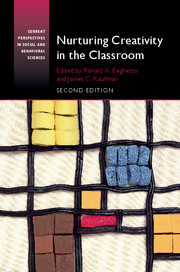Description
Nurturing Creativity in the Classroom (2nd Ed., Revised edition)
Current Perspectives in Social and Behavioral Sciences Series
Coordinators: Beghetto Ronald A., Kaufman James C.
This book provides a variety of advice, thoughts, and studies on nurturing creativity in the classroom, from top international experts.
Language: English
Subject for Nurturing Creativity in the Classroom:
Publication date: 11-2016
450 p. · 15.7x23.6 cm · Hardback
450 p. · 15.7x23.6 cm · Hardback
Description
/li>Contents
/li>Biography
/li>
As interest in creativity explodes, it has become more complicated to decide how to best nurture creativity in our schools. There are the controversial Common Core Standards in many states. Meanwhile, the classroom has become increasingly digital; it is easier to access information, communicate ideas, and learn from people across the world. Many countries now include cultivating creativity as a national educational policy recommendation, yet there is still debate over best practices. Indeed, many well-intentioned educators may institute programs that may not reach the desired outcome. The notion that schools 'kill creativity' has become a widespread social meme. We view such beliefs as both hyperbolic and problematic: they allow us to recognize there is a problem but not solve it. In this book, a wide array of international experts addresses these issues, discussing theories and research that focus on how to nurture creativity in K-12 and college-level classrooms.
Preface Ronald A. Beghetto and James C. Kaufman; Part I. Voices from the Field: 1. Changing the subject Larry Rosenstock; 2. Creativity and the invention Jake Mendelssohn; 3. Creativity and shifting roles of an educational leader: a reflection of what creativity used to mean to me what it now means Larry Audet; 4. What I used to think about creativity in schools Tim Patston; Part II. Voices from the Research: 5. Developing creativity across all areas of the curriculum Joseph Renzulli; 6. Accountability, the Common Core, and creativity John Baer and Tracey Garrett; 7. Ever-broadening conceptions of creativity in the classroom Ronald A. Beghetto and James C. Kaufman; 8. Creativity in mathematics teaching: a Chinese perspective (an update) Weihua Niu and Zheng Zhou; 9. Roads not taken, new roads to take Thomas Skiba, Mei Tan, Robert J. Sternberg and Elena L. Grigorenko; 10. The five core attitudes and seven I's of the creative process Jane Piirto; 11. Please teacher, don't kill my kid's creativity: creativity embedded into K-12 teacher preparation and beyond Fredricka K. Reisman; 12. Attitude change as the precursor to creativity enhancement Jonathan A. Plucker and Gayle T. Dow; 13. Nurturing creativity in the engineering classroom David H. Cropley; 14. Intrinsic motivation and creativity in the classroom: have we come full circle? Beth A. Hennessey; 15. Learning for creativity R. Keith Sawyer; 16. Creativity and prosocial values: nurturing cooperation within the classroom Vlad Petre Glăveanu; 17. How social-emotional imagination facilitates deep learning and creativity in the classroom Rebecca Gotlieb, Erik Jahner, Mary Helen Immordino-Yang and Scott Barry Kaufman; 18. Four faces of creativity at school Maciej Karwowski and Dorota M. Jankowska; 19. Teaching for creativity Robert J. Sternberg.
Ronald A. Beghetto is Professor of Educational Psychology in the Neag School of Education at the University of Connecticut. Prior to joining the faculty at the University of Connecticut, Dr Beghetto served as the College of Education's Associate Dean for Academic Affairs and Associate Professor of Education Studies at the University of Oregon. He is the Editor-in-Chief for the Journal of Creative Behavior and serves as an associate editor for the International Journal of Creativity and Problem Solving. He also serves on the editorial boards of Psychology of Aesthetics, Creativity, and the Arts, the Journal of Educational Research, Gifted Child Quarterly, and Creativity Studies. Dr Beghetto is a Fellow of the American Psychological Association and the Society for the Psychology of Aesthetics, Creativity, and the Arts. He has also received numerous awards for excellence in research and teaching.
James C. Kaufman is Professor of Educational Psychology at the University of Connecticut. An internationally recognized leader in the field of creativity, he is the author or editor of more than thirty-five books, including Creativity 101 and The Cambridge Handbook of Creativity. Kaufman is a past president of the American Psychological Association's Division 10, devoted to creativity. He coedits the International Journal of Creativity and Problem Solving and cofounded two APA journals. He has won numerous awards, including the Torrance Award from the National Association for Gifted Children, the Berlyne and Farnsworth Awards from the APA, and Mensa's research award.
James C. Kaufman is Professor of Educational Psychology at the University of Connecticut. An internationally recognized leader in the field of creativity, he is the author or editor of more than thirty-five books, including Creativity 101 and The Cambridge Handbook of Creativity. Kaufman is a past president of the American Psychological Association's Division 10, devoted to creativity. He coedits the International Journal of Creativity and Problem Solving and cofounded two APA journals. He has won numerous awards, including the Torrance Award from the National Association for Gifted Children, the Berlyne and Farnsworth Awards from the APA, and Mensa's research award.
© 2024 LAVOISIER S.A.S.




